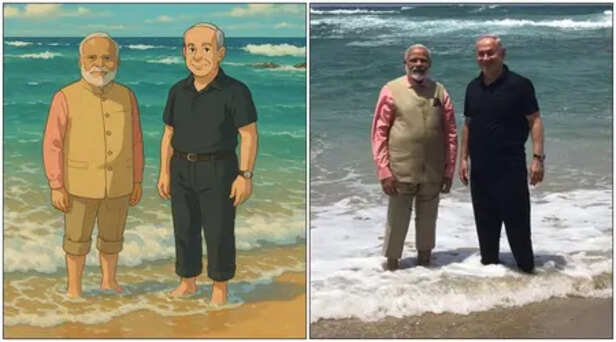Ghibli Art or Red Alert for your PRIVACY?
Amritansh Nayak | Apr 10, 2025, 19:03 IST
( Image credit : AP, Timeslife )
Imagine getting lost in the whimsical world of Ghibli art, where every stroke of color brings a sense of peace. But as you scroll through your favorite digital platforms, a red alert flashes: your privacy is at risk. This article takes you on a journey through the enchanting allure of online art, while unveiling the hidden dangers lurking beneath the surface. It’s a tale of creativity versus security—showing you how to enjoy the beauty of digital art without compromising your personal information. Will you choose the magic or the warning? The choice is yours.
Since March 27, 2025, only one thing is visible on social media and that is Ghibli art.

This article explores the sudden and overwhelming dominance of Ghibli-inspired art on social media platforms, a trend that began on March 27, 2025. It delves into the reasons behind the viral spread of Ghibli art, examining how its nostalgic and whimsical aesthetic has captured the imagination of users worldwide. The article also highlights the privacy concerns linked to this trend, as the personalization of profiles with Ghibli-themed visuals raises questions about data collection, user behavior tracking, and third-party exploitation. Furthermore, it discusses alternative approaches to enjoying digital art and staying informed without compromising personal privacy, emphasizing the importance of protecting one's data in an increasingly interconnected world. Ultimately, the article aims to strike a balance between artistic expression and privacy awareness in the digital age.
At this time, the Ghibli trend is viral everywhere. You must have also made a Ghibli style photo. There is a different fun in making your simple picture look like a magical Ghibli film or a cute cartoon. The trend of AI art generator has become quite popular. As soon as OpenAI's ChatGPT launched the Ghibli style feature, 10 lakh users joined it within an hour. Its amazing AI output, but a question is that when we upload our photo on the AI tool, who becomes its owner? Ghibli art can prove to be dangerous for you, every person is uploading his photo on ChatGPT and generating Ghibli portraits.
But no one is seeing that uploading photos on AI means that you have given consent to AI to use your photo. After this consent, your photos may be misused.
When ChatGPT was asked whether it is safe to upload personal photos in ChatGPT's Ghibli art generator, ChatGPT itself wrote. No, it is not safe and also cited privacy concerns, the thing that sells the most in today's era is our data, think for yourself, earlier it was necessary to have premium to generate Ghibli art but the CEO of Open AI recently made it free.
At what cost are we becoming a part of this trend? Is there any threat to our privacy from this Ghibli trend?
Let’s know about it...
As you post, like, or even search for Ghibli-inspired artwork, platforms are tracking your preferences. While it seems like a harmless way to express your love for these magical films, every click and interaction feeds data to algorithms that categorize your interests and behaviors. This data isn’t just for personalizing ads — it can be used for targeted marketing, profiling, and even sold to third parties. Online scam alerts, fake Ghibli- style generators are spreading across the internet, some carrying malware, others tricking users into subscriptions or phishing scams. User behavior tracking is more than just a minor inconvenience — it raises serious privacy concerns. Every time you engage with Ghibli art or other content online, companies are collecting data about what you enjoy, how you behave, and even where you are. This information could be used to create highly accurate profiles about you, potentially infringing on your privacy without your full awareness or consent.

Whenever you use an AI tool, definitely think whether tech companies can sell your data? Can we ever get our data back from them? The answer to this is hidden in those small terms and conditions, which no one reads properly. The rules of AI art generators are often complex. They do not tell us in detail how the data will be used. It is wise to use only trusted platforms. This is how your data is being misused.
The 'Ghibli effect' is not just a cool trend or fashion, but a grey zone. Different countries have privacy laws. But when you upload photos yourself, the rules change. If companies like OpenAI pick up photos from the internet, they have to follow strict rules. But if you provide your own photos, their hands are free.
If you do not 'opt-out' while uploading photos on an AI tool, your data can be used to train AI models. Your data can even be used for personalized ads and the risk doubles due to AI video generation. In such a situation, we should carefully read these terms and conditions.
Apple claims that it will not use your data. When you use ChatGPT without signing in on iPhone, Apple hides your IP address. This makes it a safe option. While there are alternative applications that allow you to create stunning Ghibli-inspired art while respecting your privacy.
These AI-based art tool allows users to upload images and generate various art styles, including Ghibli-inspired creations. These platforms are known for their privacy-conscious approach, with strong encryption for user data and a clear, transparent privacy policy. Unlike other platforms, You can use it to generate art without worrying about your personal information being exploited.
Explore the latest trends and tips in Health & Fitness, Travel, Life Hacks, Fashion & Beauty, and Relationships at Times Life!

Israel Embassy shares Ghibli art of PM Modi, Netanyahu
( Image credit : ANI )
This article explores the sudden and overwhelming dominance of Ghibli-inspired art on social media platforms, a trend that began on March 27, 2025. It delves into the reasons behind the viral spread of Ghibli art, examining how its nostalgic and whimsical aesthetic has captured the imagination of users worldwide. The article also highlights the privacy concerns linked to this trend, as the personalization of profiles with Ghibli-themed visuals raises questions about data collection, user behavior tracking, and third-party exploitation. Furthermore, it discusses alternative approaches to enjoying digital art and staying informed without compromising personal privacy, emphasizing the importance of protecting one's data in an increasingly interconnected world. Ultimately, the article aims to strike a balance between artistic expression and privacy awareness in the digital age.
Don't Miss Out: Why Everyone's Sharing Ghibli Art on Social Media and You Should Too!
But no one is seeing that uploading photos on AI means that you have given consent to AI to use your photo. After this consent, your photos may be misused.
When ChatGPT was asked whether it is safe to upload personal photos in ChatGPT's Ghibli art generator, ChatGPT itself wrote. No, it is not safe and also cited privacy concerns, the thing that sells the most in today's era is our data, think for yourself, earlier it was necessary to have premium to generate Ghibli art but the CEO of Open AI recently made it free.
At what cost are we becoming a part of this trend? Is there any threat to our privacy from this Ghibli trend?
Let’s know about it...
What’s Happening Behind the Scenes?

Israel Embassy shares Ghibli showcasing PM Modi-Netanyahu friendship
( Image credit : IANS )
Rules You Need to Know Before Sharing!
The 'Ghibli effect' is not just a cool trend or fashion, but a grey zone. Different countries have privacy laws. But when you upload photos yourself, the rules change. If companies like OpenAI pick up photos from the internet, they have to follow strict rules. But if you provide your own photos, their hands are free.
This is how personal data is used
Don't Miss Out on These Privacy-Friendly Options!
- Deep Dream Generator (Privacy-Focused)
- Artbreeder (Privacy-Conscious Platform)
- Runway ML (Secure and Private)
- PaintsChainer (Secure AI Art Generator)
- Pixray (Open-Source and Privacy-Focused
These AI-based art tool allows users to upload images and generate various art styles, including Ghibli-inspired creations. These platforms are known for their privacy-conscious approach, with strong encryption for user data and a clear, transparent privacy policy. Unlike other platforms, You can use it to generate art without worrying about your personal information being exploited.
- Use Private Browsing: When searching for or sharing Ghibli art, opt for private or incognito mode to prevent websites from tracking your browsing habits.
- Adjust Your Social Media Privacy Settings: Make sure your profiles are set to maximum privacy, limiting who can see your posts and interact with your content.
- Limit Data Sharing: Be mindful of the permissions you grant to apps and platforms. Disable location tracking and third-party access wherever possible.
- Use VPNs: A Virtual Private Network (VPN) can help mask your location and encrypt your internet connection, protecting your online activity from unwanted tracking.
Explore the latest trends and tips in Health & Fitness, Travel, Life Hacks, Fashion & Beauty, and Relationships at Times Life!
